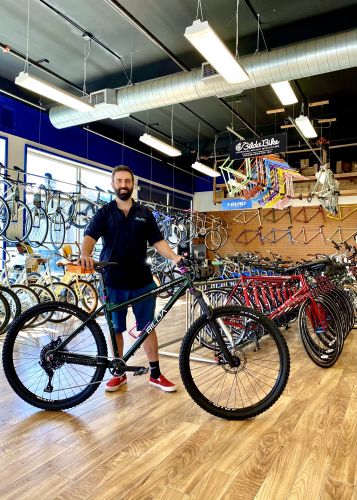A version of this article ran in the February issue of BRAIN.
CHARLESTON, S.C. — Daniel Einhorn always knew there was a better way to do business in the bicycle industry. As a self-proclaimed outsider out of college, he owned a large retail bike store for the past decade and learned some harsh truths.
"It was my goal to share my simple experience with others by offering better prices and treating people in a welcoming way where they would feel encouraged to grow with the sport," Einhorn said. "As a dealer, I hated the way I was treated by the big brands. Terrible customer support, cringy sales tactics that put overwhelming pressure on me. Threatening to drop accounts if you don't order X amount of bikes."
Einhorn took matters into his own hands and transitioned from full-time retailer to supplier in the past year to start BildaBike, a custom-built bike company. In January, he launched a B2B segment with about 30 dealers. He remains a part-time dealer with a BildaBike retail store and e-commerce center based in Charleston, with a 7,500-square-foot warehouse across the street.
"Now we have more bikes in stock than ever (about 3,000 in January), and we are setting up logins for all our dealers," he said. "My staff and I take pride in pairing the knowledge we have of bike design with our front-line experience of working retail to create products that customers identify with."
BuildaBike models include cruisers, hybrids, road, single-speed road, gravel, and kids. It also carries branded pumps, locks, and baskets. "We play the limited variety to our advantage," Einhorn said. "We typically offer only a few models per category. Sure, we don't hit as many different price points as other brands, but it is simple for the retailer and consumer."
Those bikes began moving off the retail floor quickly in response to the bike boom last year, driven by the COVID-19 pandemic. Einhorn said e-commerce sales took off, and he used that money to obtain more bikes from China and Taiwan. The timing was right to expand to B2B. With a deep inventory of bikes, Einhorn said BildaBike established new accounts with stores to supply them in the second half of last year.
"There were things about my bikes that I thought could be competitive on a national scale," he said. "However, I needed to tighten up a few back-end operations before making the launch."
He also noted another factor.
"In previous years, with bike stores declining, brands were fighting harder and harder for floor space. It was a crowded market. Now, all of a sudden, it seems like a gap has opened up for me where I might be able to find my place on the national stage."
Einhorn said his business, which has 10 employees, has thrived as a supplier where others have struggled because of his streamlined operation.
"I think other brands are getting bikes, but they are getting gobbled up so quickly that it's hard to even notice," he said. "As soon as they arrive, they are gone. Big companies are so backlogged that it is taking them a long time to get caught up.
"Meanwhile, I'm on the exact opposite side. I was typically in a position where I had a lot of bikes and was primarily moving them through my one retail outlet and B2C on my website. I needed a way to move units quicker to support ordering containers."
He said the bikes ordered in the spring took a while to receive, but now that he has them, they're moving quickly.
"Long story short, I only need to satisfy a few dealers to make what seems like big progress for me. Whereas the other companies are so far behind, it will take them a long time to feel like they have satisfied their customers."
He said his goal now is to sell more volume of a less-varied product line.
"I like to think of my old operation as a diner with a 20-page menu. I'm trying to get back to being a burger shop. And if you come to this burger shop and you want a quesadilla, we can't help you."
He said abandoning service is a bit of a risk these days, but going beyond his local market and focusing on selling fewer products outweighs that.
"Over the years, I have received positive feedback about the way that we interact with customers on the front lines in the retail environment, then use that feedback to produce bikes that give customers a lot of bang for their buck," Einhorn said.


